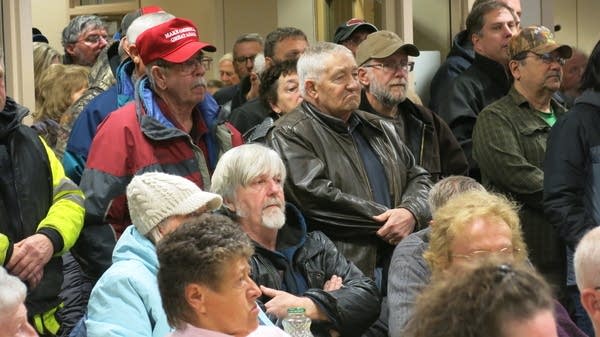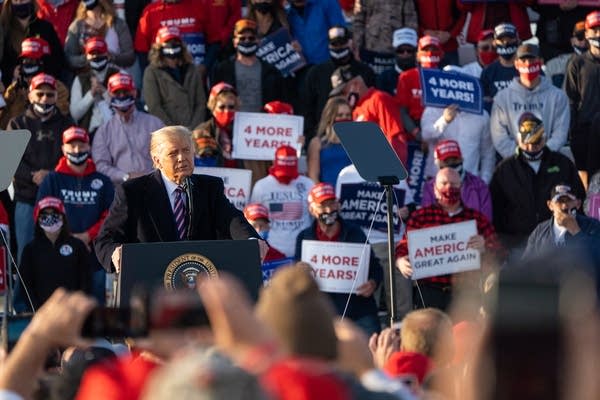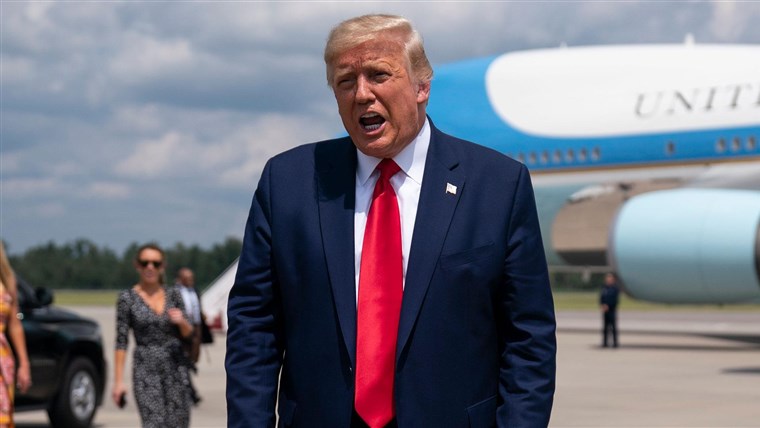Mike Bredon never had political aspirations. He wanted to be in movies — and he has the look. Clark Gable mustache. Cary Grant chin. He was, very briefly, the face of a Minnesota tourism ad campaign. He wore plaid. He may have swung an ax, but who can remember?
But a few months ago, Bredon submitted the paperwork to get his name on the ballot in a race for a seat on the Beltrami County Board of Commissioners in north-central Minnesota.
Bredon’s candidacy for the decidedly uncinematic job of county commissioner can be traced back to a single night in January. Months earlier, President Donald Trump had signed an executive order giving counties the right to refuse or remain open to refugees.
The Beltrami board voted to refuse them — the first in the state, and one of the first in the nation to do so.
“That vote was a black eye for this town,” Bredon said. “That was a global news story. I started thinking, we can’t let this continue.”
So he tossed his hat in the ring. And he wasn’t the only one.
County government was never designed to be partisan. It’s road work and zoning laws. It’s boring.
It’s supposed to be boring.
But for the last year, county government meetings across the state haven’t been boring at all. Julie Ring, the executive director of the Association of Minnesota Counties said county boards have been roped into big national issues.
They’re issues, she said, that counties have no actual authority to deal with.
Beltrami County, in north-central Minnesota, is a prime example.

The Beltrami County Board room was packed with residents as it took up the question of refugee resettlement. Most came out to ask the commissioners to vote against the possibility of refugees resettling in the area.
John Enger | MPR News file
It started with the refugee resettlement vote back in January — the moment that prompted Bredon to join the race.
As he watched the news coverage, he said, he began to notice a troubling thing: The vote wasn’t over an issue under the county’s purview. It was symbolic.
The county hasn’t helped resettle refugees for decades, and there were no plans in the works for that to change. And after the vote in Beltrami County, Trump’s executive order was blocked by a federal judge. So the whole thing was not only symbolic, it was kind of for naught. To Bredon, it started looking like a ploy to sow division.
“It was a test,” he said, “and unfortunately we were one of the first to fail at it.”
After the refugee vote, there was another hot-button moment: The board chairman wanted to make Beltrami County a so-called Second Amendment sanctuary. He and a few others also drafted a resolution demanding the governor ease up on his COVID-19 restrictions.
And when those efforts didn’t move forward, two county commissioners took part in a public protest against statewide mask ordinances. The board chairman spoke at a gun rights rally in Bemidji — led by the anti-government extremist group, the Boogaloo Boys.
During his campaign stop in Bemidji last month, Trump touched on all the issues causing controversy in the county — focusing primarily on immigration and refugee resettlement, saying northern Minnesota would be “overrun” by Somali refugees, if not for him.

President Donald Trump addresses the crowd during his rally in Bemidji on Sept. 18.
Evan Frost | MPR News file
“I’m the difference and I’m the wall,” Trump told the crowd of several thousand, gathered at an airport hangar. “I’m the wall between the American dream and chaos.”
These incendiary national issues are shaping local elections across Minnesota, Ring said. They’ll sway some voters, and they’ll definitely inspire candidates.
“If there’s an issue that gets a lot of news coverage and community attention,” she said, “and people have strong feelings about it — that’s the sort of issue that might cause someone to get into a political race.”
Take Beltrami County, for example. There are three commissioner races on the ballot this November, out of five total seats.
Bredon is running against incumbent Jim Lucachick — one of the more outspoken commissioners who opposed refugee resettlement. The race has become something of a referendum on that vote.
Then there’s Danny Anderson, running against incumbent Tim Sumner. Sumner was in favor of refugee resettlement — against the board’s vote — and against the Second Amendment sanctuary idea. Anderson said he believes exactly the opposite. So much so that he marched with the Boogaloo Boys in Bemidji.
Finally, there’s Joe Vene, running against incumbent Reed Olson. That race is inextricably tied to the refugee resettlement vote. Olson is the whole reason the issue came up in the first place. He proposed the vote, thinking it would go in favor of supporting refugees. He saw it as an opportunity for Beltrami County to take a stand as an open-minded, welcoming place.
Vene argues that the vote made the area look bad, and never should have happened.
“It was ill-timed,” Vene said. “It made us look racist. For heaven’s sake, I’m not racist.”
Olson, for his part, doesn’t feel bad at all.
“I’m not going to regret insisting that we do what we were ordered by the president to do,” he said. “I also had no idea that it would get so weaponized. I got all kinds of threatening phone calls. Telling me to leave town. Calling me a race traitor.”
He said he got death threats — a lot of them — over what was ultimately a symbolic issue.
None of those hot-button county disputes accomplished much, on a tangible level. Refugees would not have resettled in Beltrami County, even if the vote had gone another way. The Second Amendment sanctuary vote, had it moved forward, wouldn’t have changed much, either.
And the masks are still required statewide, under an executive order. Now, COVID cases are spiking in northern Minnesota. Personal protective equipment is becoming a lot less partisan than it was a few months ago.
Still, it’s possible those controversial, cultural issues will now shape county leadership.
It’s also possible they might not. Olson, an incumbent, said it’s tough to unseat an incumbent in Beltrami County.
The boring-ness of local politics, he said, might be more resilient than we know.
Have questions leading up to the Election Day? #AskMPRNews. We want to hear your stories, too. #TellMPRNews what is motivating you to get out and vote this year.
You make MPR News possible. Individual donations are behind the clarity in coverage from our reporters across the state, stories that connect us, and conversations that provide perspectives. Help ensure MPR remains a resource that brings Minnesotans together.


